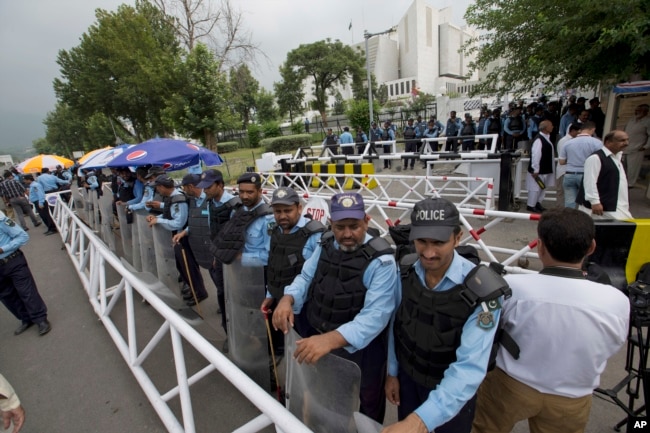Pakistan Supreme Court Disqualifies Sharif; He Steps Down

Pakistani Prime Minister Nawaz Sharif, center, with his son Hussain Nawaz, right, in Islamabad, Pakistan, June 15, 2017. Sharif appeared before a Supreme Court-appointed team investigating allegations against his family’s offshore companies and money laundering.
ISLAMABAD —
Pakistan’s Supreme Court has disqualified Prime Minister Nawaz Sharif from holding public office and ordered him to step down immediately.
A spokesman for the prime minister’s office announced shortly after the court issued its ruling that Sharif accepted the court decision “despite his serious reservations” and relinquished charge of office.
The court convicted Sharif on charges of amassing overseas assets, concealing them and living beyond his means.
The five-member panel of judges in its unanimous ruling Friday also ordered anti-corruption authorities to swiftly open investigations into Sharif’s daughter, Maryam Nawaz, her husband and Pakistani Finance Minister Ishaq Dar. Dar has also been banned from holding public office and ordered to step down.
The court in its ruling has also ordered opening of corruption cases against two sons of Sharif, Hussain Nawaz and Hussan Nawaz.
Panama Papers
The charges against the Sharif family and others stemmed from leaked financial documents known as the Panama Papers, which listed the prime minister’s children as holders of offshore bank accounts and posh overseas property.
The documents also named hundreds of other Pakistani citizens.
Friday’s landmark decision sparked nationwide celebrations led by the opposition Tehreek-e-Insaf party of cricket-star-turned politician, Imran Khan.
Khan’s party led the legal battle against Sharif and his family in the Supreme Court.
The judges ruled that Sharif has been disqualified from office because he had been dishonest with parliament and misled the court while providing details of his wealth.
It was not clear immediately as to who will be appointed to take over from Sharif to complete the five-year term of his party’s government, which is to end in June 2018.
Cloud over earlier terms
Sharif twice served as prime minister in the 1990s, and on both occasions his government was accused of massive corruption and mismanagement.
The 67-year-old politician was elected a third time in 2013, after he had returned from years of exile in Saudi Arabia.
Sharif has denied wrongdoing and has also alleged a conspiracy against him, though he hasn’t named anyone. His allies have spoken of elements in the judiciary, backed by Pakistan’s powerful military with which Sharif has strained relations, acting against the prime minister.
The army has denied any direct involvement.
The legal proceedings against Sharif have captivated Pakistan, where those in power are seldom subjected to the kind of scrutiny undergone by the premier.
























